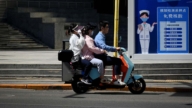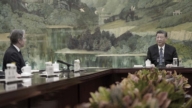【新唐人2012年8月14日訊】近年來,中國大陸各種社會問題不斷顯現,社會矛盾不斷爆發。最近有學者指出,中國存在十大嚴重社會問題,並正在不斷引爆,中共所謂的「大國崛起」已經無始而終。最糟糕的是,政改之路已被堵死,整個社會瀰漫末世心態,與當年蘇聯共產黨的末世景象非常相似。
日本《外交學者》雜誌最近發表美國政治學家裴敏欣教授的文章指出,曾經有人認為中國大陸正在「崛起」,但近幾年來,尤其是2008年北京奧運之後,中國大陸的各種形勢發生了全面變化,一切都在走下坡路。
文章寫到,自從捲入全球經濟危機後,中國經濟就再也沒有恢復元氣。因為獨生子女政策導致的勞動力短缺、當局為片面追求快速增長而導致的環境惡化等問題,都會嚴重制約中國經濟的增長。而最大的發展阻力則來自於中共體制本身,但當局幾乎不可能進行根本性的變革,因為這會終結共產黨的統治。
美國「紐約城市大學」經濟學教授陳志飛對《新唐人》表示,裴敏欣教授所說的,並不是指中共政權在2008年達到了強盛,而是它多年來的苦心經營達到了最高峰。
陳志飛:「在這個頂峰之後,它就連苦心經營、補補帖帖的能力都沒有了,會明顯的暴露出衰敗的景象。我們現在看到中共四面楚歌、內外交困的景象,恰恰反映出這一點。」
美國「南卡羅來納大學」教授謝田也認為,中共的所謂「崛起」實際上從沒有真正實現過,是無始而終。那些所謂的「崛起」成就都是站不住腳的。
美「南卡羅來納大學」教授 謝田:「首先中國經濟數字的真實性是完全值得懷疑的。第二,所謂的經濟崛起,是在嚴重的犧牲了老百姓的利益、民眾的利益,在一個貧富差距日益懸殊、貧富日益分化這樣一個基礎上造成的。」
《亞洲週刊》報導,大陸知名社會學家鄧偉志通過研究,提出中國一系列社會問題中最突出的十大矛盾,這包括:權力過於集中;社會透明度太低;新聞輿論受到嚴格管控;經濟畸形;貧富兩極分化嚴重;城鄉差距太大;腐敗盛行;道德滑坡等。
謝田:「經濟已經走到頭,政治——實際上共產黨的統治也走到頭了。但實際上共產黨本身不會輕易放棄它手中的權力,因為它血債太多,欠中國老百姓太多,作惡太多。」
據陳志飛教授介紹,在此之前,敏欣教授曾經通過研究得出結論,從政治、經濟的角度看,一個專政制度最多只能維持70年。
陳志飛:「專制制度在現代社會這種模式下,它跟經濟發展的這個衝突,還有和大眾的需求(衝突),使得它只能勉強存在70年。」
《亞洲週刊》的報導指出,中國大陸當今的10大問題已經堵死了中共政改之路。如果要化解這10大社會矛盾,需要開拓新的思維。
採訪/朱智善 編輯/李謙 後製/王明宇
Scholars Claim, The CCP’s Claim of 『RISE’ Reached its Peak Even Before it Started.
In recent years more and more social problems
have emerged in Mainland China.
Along with this, social conflict has also been on the increase.
Some scholars have said, at present ten serious social conflicts
are threatening stability amongst the Chinese society.
The CCP’s claim to a, ‘Rise of a Great Nation’
has ended even before it begun.
The sad thing being, in China today,
there seems little hope of political reform.
The mood amongst the Chinese people of today,
is one of an end of an era.
Much like the situation before
the dissolution of the Soviet Union.
Japanese magazine ‘The Diplomat’, recently published
an article written by Pei Minxin, a political science professor.
The article remarked how a lot of people used to believe
Mainland China was “rising” in the world;
however, since the Beijing Olympics the situations in China
have completely changed becoming ever worse in almost every aspect.
The article wrote how China’s economics had never
recovered since being involved in the global economic crisis.
Also, due to a one-child policy and the havoc created
by CCP’s short term pursuits to an economic output,
all these things will have serious impact upon the future
developments in China.
Yet the biggest problem still lays in the nature of CCP
regime itself.
The CCP would never itself, implement any real political
change,
since this would mean the end of its governance and control.
Chen Zhifei, economics professor from City University
of New York (CUNY), told NTD
Professor Pei’s article only indicated the CCP’s regime had
reached its peak in 2008,
in an elaborative “rising” of image in front of the global society.
It did not however indicate any real proof of national strength.
(Cheng Zhifei, economics professor from CUNY):
”After the peak in 2008, the CCP even lost its capability in maintaining its image & hiding problems,
which was quickly followed by the eventual decline of the
whole regime.
This can be confirmed by all the difficulties the CCP
has currently had to handle, both from inside and outside, as we can now see.”
Xie Tian, professor at University of South Carolina,believes,
the CCP’s claim to a “rise” had never been achieved;
the “rise” had reached its end even before it had started;
all the arguments in favor of the “rise” were untenable.
(Xie Tian, professor at University of South Carolina):
”First of all, the reliability of official statistics about China’s economy is definitely questionable.
Second, the so-called “economic development” is based
upon sacrificing the benefits of most Chinese civilians.
This development only leads to an increasing gap
between the wealthy and the poor.”
Hong Kong magazine Yazhou Zhoukan, reported how a famous
Chinese sociologist, Deng Weizhi presented China’s ten most prominent problems, according to his research.
The problems include: low social transparency, strict control
over media, malfunctioning economy,
huge gaps between the wealthy and the poor, unbalanced
development between urban and rural areas, rampant corruptions and a decline in morality.
(Xie Tian, professor at University of South Carolina):
”China’s economy has almost come to its end, along with the CCP’s governance.
The real problem lies in the fact, CCP won’t easily
give up its power.
It has committed too many crimes upon the Chinese people.
Too many ‘Bloody Debts’ are now weighing heavily upon it.”
Chen Zhifei introduced a fact, according to previous research
by Professor Pei Minxin, a dictatorship regime can only sustain up to 70 years politically & economically.
(Cheng Zhifei): ”Under the mode of modern society,
the dictatorship regime conflicts with the economic development and public needs,
which then limits its lifetime to no longer than 70 years.”
Yazhou Zhoukan’s report remarked how the ten serious
social problems had blocked all possible paths towards a successful & political reform by the CCP;
it would require some new thinking methods to resolve
all those conflicts.





























